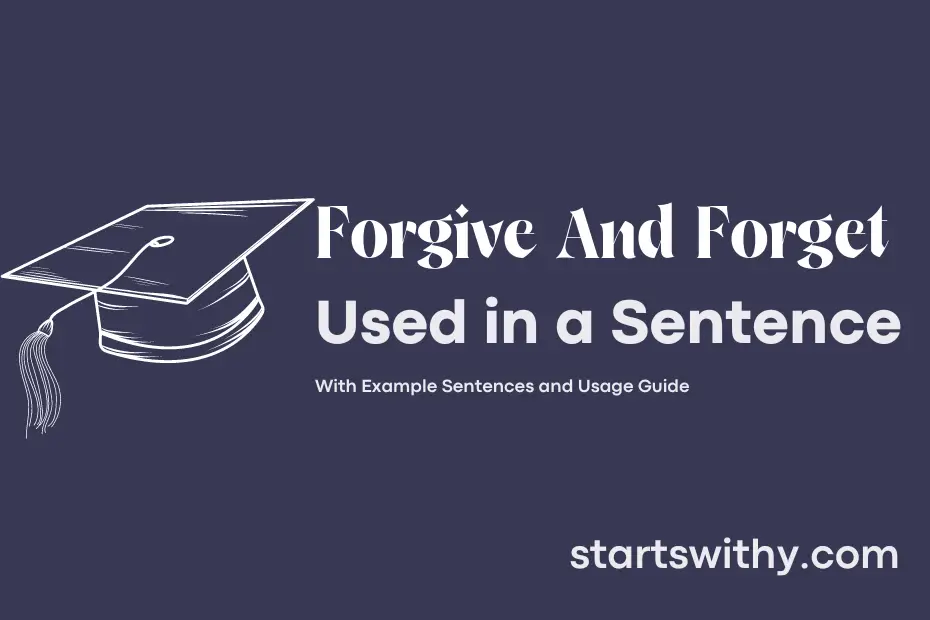Have you ever heard the saying “forgive and forget” but wondered what it truly means? This idiom encourages individuals to not only forgive someone for their wrongdoing but also to let go of any resentment or anger associated with the situation.
To “forgive and forget” is a phrase used to describe the act of pardoning someone for their actions and then moving on from the experience without holding a grudge. It suggests that one should release any negative feelings towards the person who has caused harm and not dwell on the past transgression.
7 Examples Of Forgive And Forget Used In a Sentence For Kids
- Forgive and forget when your friend accidentally takes your crayon.
- It’s important to forgive and forget if someone says something mean to you.
- Let’s all try to forgive and forget any small fights we have on the playground.
- Remember to forgive and forget if someone accidentally bumps into you in line.
- We should always forgive and forget when someone apologizes for making a mistake.
- Forgive and forget if your classmate forgets to share their snacks with you.
- The best way to make new friends is to forgive and forget any misunderstandings that may happen.
14 Sentences with Forgive And Forget Examples
- Forgive and forget that embarrassing moment during the college presentation and focus on improving your public speaking skills.
- Make sure to forgive and forget any disagreements with group members while working on a project together.
- It’s important to forgive and forget any negative feedback from professors and use it as motivation to do better next time.
- Don’t hold grudges against classmates, always remember to forgive and forget any misunderstandings that may arise.
- When dealing with difficult professors, it’s best to forgive and forget any conflicts in order to maintain a positive learning environment.
- Remember to forgive and forget any failures in exams and focus on studying harder for the next one.
- After a breakup, it’s essential to forgive and forget any hurtful words that were said in order to move on and focus on personal growth.
- When facing rejection from a job or internship, it’s important to forgive and forget and keep working towards your career goals.
- Don’t let past mistakes define your college experience, always strive to forgive and forget in order to grow and learn from them.
- It’s okay to make errors while participating in extracurricular activities, just remember to forgive and forget and keep improving your skills.
- When navigating friendships in college, it’s crucial to forgive and forget any misunderstandings in order to maintain positive relationships.
- It’s easy to get overwhelmed with assignments and deadlines, so make sure to forgive and forget any self-criticism and focus on taking one task at a time.
- If you miss out on a social event due to academic commitments, it’s important to forgive and forget any feelings of FOMO and prioritize your studies.
- While preparing for exams, try to forgive and forget any distractions or procrastination habits that may have hindered your study sessions.
How To Use Forgive And Forget in Sentences?
Forgive And Forget
When using the phrase Forgive And Forget in a sentence, it is important to understand its meaning and how to properly incorporate it into your writing or speech.
Forgive And Forget is an idiom that means to give up any resentment towards someone and to stop thinking about a past wrongdoing.
Here are some tips on how to use Forgive And Forget in a sentence:
-
Correct Context: Make sure the situation calls for forgiveness and moving on. Use the phrase when discussing letting go of a grudge or moving past a mistake.
-
Proper Punctuation: Enclose the phrase within quotation marks to indicate that it is an idiom. For example, “She decided to forgive and forget his hurtful words.”
-
Tone and Intent: Consider the tone and intent of your sentence. Forgive And Forget is often used in a positive and encouraging way to promote reconciliation and healing.
-
Application: Use the phrase in situations where forgiveness and moving forward are key. For example, “It’s time to forgive and forget the past and focus on building a better future together.”
By following these guidelines, you can effectively incorporate Forgive And Forget into your sentences to convey the message of letting go of past grievances and moving towards a more positive future.
Conclusion
In relationships, it is often said that one must learn to forgive and forget in order to move forward. Whether it be forgiving a friend for a mistake or letting go of past grievances in a romantic relationship, the act of forgiveness can lead to healing and growth. By choosing to forgive and forget, individuals can release the burden of resentment and create space for positive experiences and stronger connections.
Forgiveness allows us to free ourselves from the negative emotions that come with holding onto grudges, while forgetting enables us to focus on the present and future rather than dwelling on the past. While it may be challenging, the ability to forgive and forget can pave the way for healthier relationships and a more peaceful state of mind.



